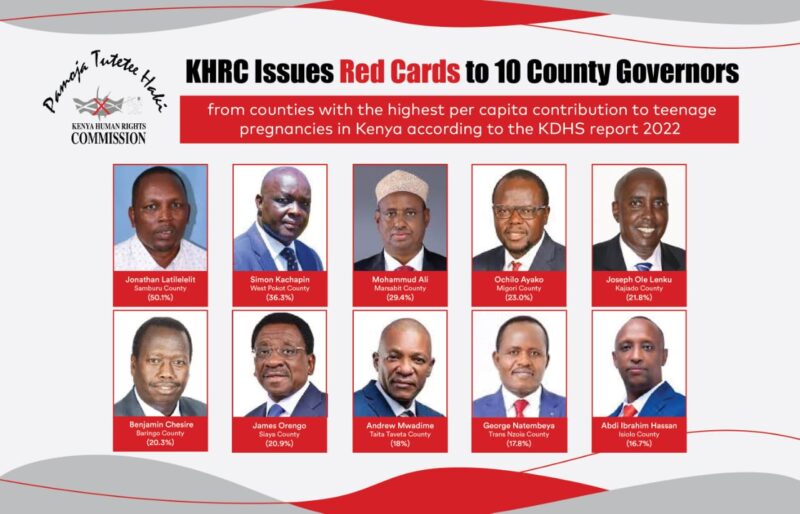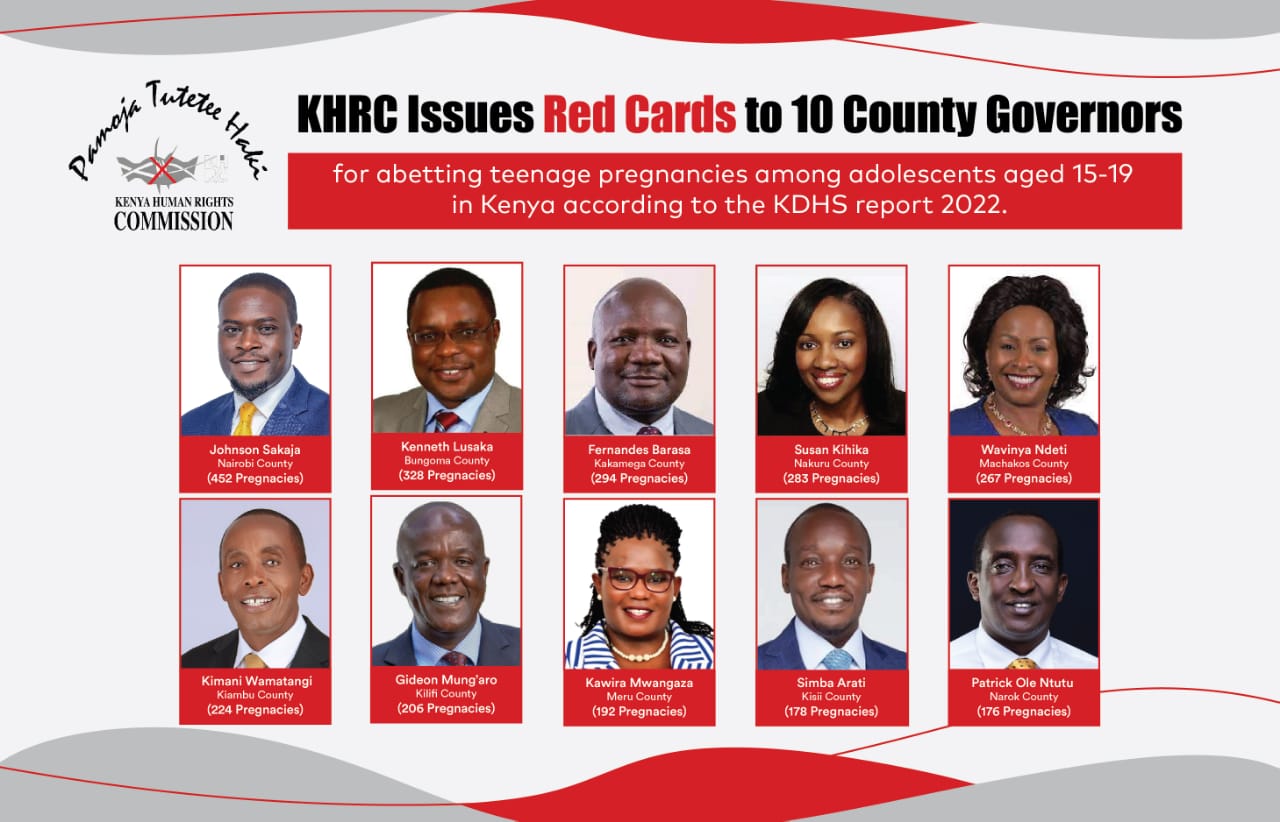Nairobi, Kenya—As we approach the International Women's Day celebrations, we must address a pressing issue plaguing our society: the crisis of unintended teenage pregnancies in Kenya, which comes with gross human rights violations. A recent report by the National Syndemic Disease Control Council (NSDCC) sounded the alarm, revealing a shocking statistic of 696 adolescent girls impregnated daily in 2023.
These numbers are a result of, among others, a lack of access to comprehensive sexual and reproductive health services and education. Health is a function shared between the counties and the national government, and as such, both share the blame for this crisis. Moreover, parents have a responsibility, under the Children’s Act and the constitution of Kenya, to promote the well-being and welfare of their children. The constitution tasks counties to promote primary and public healthcare to mitigate these unintended teenage pregnancies. Separately, the national government, through the Ministry of Health, is responsible for developing guidelines and policies for healthcare provision, including sexual and reproductive health.
Therefore, the national government’s action can potentially suppress or escalate the crisis at hand. In May 2023, the Ministry of Health pulled out of a major regional commitment that would have mitigated unintended teenage pregnancies and reduced HIV and sexually transmitted diseases. Kenya withdrew from the Eastern and Southern African (ESA) ministerial commitment to comprehensive sexual education. The withdrawal signals the lack of commitment by the government to protect our girls from early and unintended pregnancies and enforce laws to stop this scourge.
Resolving this crisis seems distant, especially considering the reckless remarks made by some leaders, including Bungoma Governor Kenneth Lusaka. Lusaka said pregnant girls should be barred from returning to class, undermining their right to education and victimizing them more. Ironically, Bungoma is one of the highest contributors to teenage pregnancy, with a prevalence rate of 19 per cent at the county level compared to the national average of 15 percent.
Counties with high teenage pregnancies
KHRC analyzed data from the Kenya Demographic and Health Survey (KDHS) 2022 report and came up with the top 10 counties with high numbers of teenage pregnancies among adolescent girls aged 15 - 19 years. Our girls cannot be reduced to statistics. Every girl counts, and a human rights violation affecting one girl is significant. The counties, according to KDHS, are:
- Nairobi County (452)
- Kakamega County (328)
- Bungoma County (294)
- Nakuru County (283)
- Kiambu County (267)
- Kilifi County (224)
- Meru County (206)
- Kisii County (192)
- Machakos County (178)
- Narok County (176)
Based on this, KHRC is issuing red cards to the following governors and a Cabinet Secretary for not making tangible and progressive steps to mitigate these unintended teenage pregnancies:
- Nairobi’s Johnson Sakaja
- Bungoma’s Kenneth Lusaka
- Kakamega’s Fernades Barasa
- Nakuru’s Susan Kihika
- Machakos’ Wavinya Ndeti
- Kiambu’s Kimani Wamatangi
- Kilifi’s Gideon Mung’aro
- Meru’s Kawera Mwangaza
- Kisii’s Simba Arati
- Narok’s Patrick Ole Ntutu
And,
11. Health CS Susan Nakhumicha.
We are also highlighting counties with the highest per capita contribution to teenage pregnancies in Kenya. These are:
- Samburu County 50.1 percent
- West Pokot 36.3 percent
- Marsabit 29.4 percent
- Migori 23.0 percent
- Kajiado 21.8 percent
- Baringo 20.3 percent
- Siaya 20.9 percent
- Taita Taveta 18 percent
- Trans Nzoia 17.8 percent
- Isiolo 16.7 percent
Consequently, KHRC is issuing cards to the following governors for not making tangible and progressive steps to mitigate these unintended teenage pregnancies:
- Samburu’s Jonathan Lelelit
- West Pokot’s Simon Kachapin
- Marsabit’s Mohammud Ali
- Migori’s Ochilo Ayako
- Kajiado’s Joseph Ole Lenku
- Baringo’s Benjamin Chesire Cheboi
- Siaya’s James Orengo
- Taita Taveta’s Andrew Mwadime
- Trans Nzoia’s George Natembeya
- Isiolo’s Abdi Ibrahim Hassan

According to the KDHS, some of the causes of these pregnancies included poverty, sexual gender-based violence, low levels of education, harmful cultural practices, and; from other studies, the extended school closures experienced since 2020.
As a result, girls aged 15 to 19 years often face numerous human rights violations.
- The right to education: girls form a large percentage of school drop-outs
- The rights to life and dignity: teenage pregnancies contribute to life-threatening conditions
- The right to health: They face barriers to accessing sexual and reproductive health services against Article 43 of the Constitution of Kenya.
- The right to equality and freedom from discrimination: many of these girls are exposed to stigma and other forms of discrimination
- The right to freedom and security of the person: owing to the exposure to sexual and gender-based violence faced by our girls
Overall, the above consequences amount to a violation of Article 53(1) (d) of the Constitution, which provides that every child has a right to be protected from abuse, neglect, harmful cultural practices, all forms of violence, inhumane treatment and punishment, among others.
The above have been red-carded for the aforementioned teenage pregnancies, which could have been prevented had the governors implemented proactive strategies to address them per county mandate. Additionally, Kenya's withdrawal from the Eastern and Southern African (ESA) ministerial commitment to comprehensive sexual education and other critical policies could have contributed to these pregnancies.
Importantly, we call on the following to take decisive actions to mitigate unintended teenage pregnancies:
- The Ministry of Health must recommit to the Eastern and Southern Africa Commitment on comprehensive sexual education.
- The Ministry of Education must ensure that every teenage girl who falls pregnant is unconditionally permitted back to school and provided with the necessary psychosocial support without discrimination.
- Governor Kenneth Lusaka must retract his statement against schoolgirls who fall pregnant and commit to facilitating their education.
- The Council of Governors should interrogate the crisis as a matter of urgency and offer a collective voice on policy issues affecting the prevention and management of teenage pregnancies in Kenya.
- The parents must, in line with the Children’s Act and the constitution of Kenya, promote the well-being and welfare of their children.
Signed
Kenya Human Rights Commission (KHRC)


